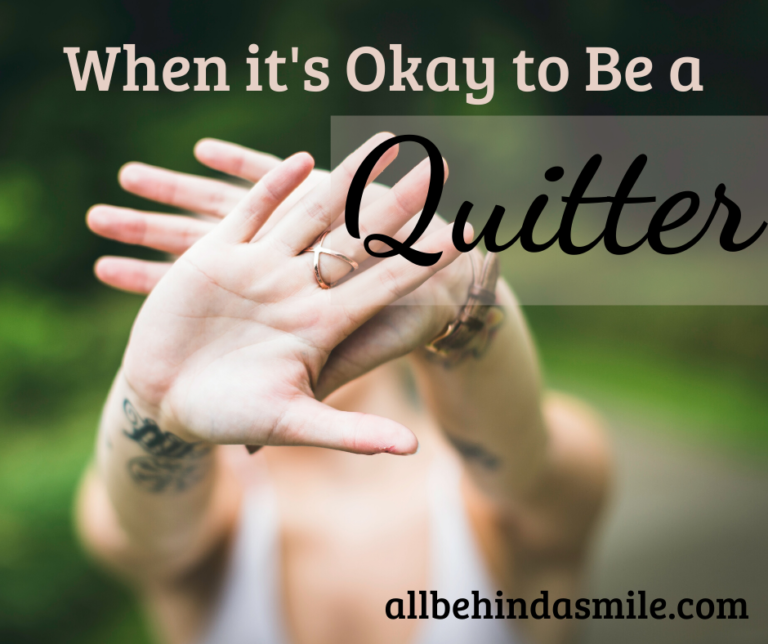
Christian, wife, “hybrid” mama, I run the site All Behind A Smile to help others like me.
Somehow, being a quitter often equates to being a “failure” in many people’s minds. They seem to believe that the two are synonymous … but they don’t have to be. In fact, I would argue that the two are entirely different words for a reason.

When is it okay to be a “quitter”?
The big caveat here is, you must learn that there will be consequences (as stated in the bullet points above) and that you could have avoided
a. breaking your commitment and
b. ruining your reputation for keeping your word …
by not agreeing to anything halfheartedly. If it’s not a definite yes, then it’s a no.
And no, it’s not easy to tell people you aren’t willing to do ___ (fill in the blank) – but it’s not easy to back out after agreeing and facing the consequences either. It’s also not easy to follow through and do something you never truly wanted to do in the first place.
Right now, it probably appears that it’s better to suffer through the task/activity/whatever it may be rather than face the consequences of quitting … and you can. Remember, however, every time you agree to something you don’t truly want to do, you are saying “no” to something else.
“No” to your family and friends. “No” to time to practice self-care. “No” to the steps that bring you ever closer to your big goals.
If you’ve ever gotten halfway through something (let’s use quilting as a minor example) only to realize you HATE quilting, it’s okay to quit! Yes, you invested time, sweat, tears, even money already – but you are just wasting even more time, sweat, tears, and money by continuing to suffer through making that quilt.
Even if you are halfway done, saying “no” to finishing that quilt means “yes” to something else. “Yes” to moving on to another goal, one that is actually important to you.
We place value on what we have invested in – whether the investment is time, money, effort, or something entirely different – but the value is entirely in our perception. When we are the ones giving something value, we can choose that the value no longer applies – and stop giving it more value of our perception by not continuing to invest in it!

There is a major difference between a quitter and a failure. Are you ready for it?
A failure does not exist.
Since being a failure is all in our perception of ourselves, and our perception of ourselves is (generally) highly skewed, we cannot (generally) trust our own opinions of our shortcomings.
Yes, we might be terrible at math, or hate to work outside in the heat, but we only consider ourselves a “failure” if we can’t or won’t do something we believe defines us.
Other’s opinions don’t define us, despite what we often allow ourselves to believe (or what others sometimes think we should believe).
Our own opinion can create the walls of the box we put ourselves in, but we are defined by who we are. Our own opinion of ourselves is ever-changing, rarely consistent. We can be a “failure” one minute, a “success” the next.
All of which is a long way of saying, since being a failure is nothing more than someone’s perception of themselves (or someone else), it’s an abstract construct we have created and defined that holds no meaning beyond what we give it.
The meaning of quitter is far more substantial and defined than the meaning of failure. Although I won’t go so far as to write out the actual definition here, we will examine “quitting” briefly.
Where “failure” is a perception, an abstract concept, being a quitter is something you have done (or rather, stopped doing). What you might not realize, is that you can be a “quitter” without the negative connotation attached.
Much like being a “failure”, being a “quitter” only has the power we give it. If we decide that being a quitter is okay, or okay for certain reasons, then we release the power of that word over us.
Realize that there are socially acceptable times to quit something – like quitting smoking, or drinking, or doing drugs – and then expound upon that. If quitting is acceptable in those times, (although albeit those activities are generally considered more harmful) then there must be other times it’s “okay” to quit.
Start with small concepts like the above, and work your way up.
If a, then b.
Eventually, you will realize that the activities you are quitting are harmful. Harmful to your ability to say “no” (if it was reluctantly agreed to). Harmful to your goals (because it’s taking time from the ones that matter to you). Harmful to you, because you are trying to do or be something you are not.
If it’s harming you, it’s okay to quit. If it’s sucking your time, energy, and motivation, it’s okay to quit. If you hate it, it’s okay to quit.
Quitting does not equate to failure.
Whether it was a big decision or a small one, have you been a quitter recently? What did you quit? Let me know in the comments below.

Christian, wife, “hybrid” mama, I run the site All Behind A Smile to help others like me.
This site uses Akismet to reduce spam. Learn how your comment data is processed.


Leave a Reply